Peter MALONE
Saturday, 18 September 2021 19:21
Hancock
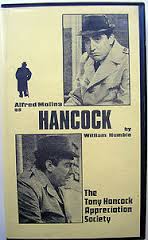
HANCOCK
UK, 1991, 116 minutes, Colour.
Alfred Molina, Frances Barber, Mel Martin, Malcolm Sinclair, Jim Carter.
Directed by Anthony Smith.
Hancock is a BBC telemovie, a portrait of the English comedian during the last ten years of his life. Hancock was a very popular comedian on radio and television, especially with Hancock's Half Hour. The film focuses initially on one of his sketches, The Blood Donor, famous for exemplifying his style. Hancock did not make a successful transition to movies, in fact being sacked from the Disney Studios Bullwhip Griffin. An alcoholic, erratic in his treatment including his writers, his wife, friends, he was often in depression. In 1968 he came to Australia and there committed suicide, leaving a note saying that too much had gone wrong in his life too often.
Hancock is well portrayed by Alfred Molina (Letter to Brezhnev, Prick Up Your Ears, American Friends, Not Without My Daughter). He impersonates Hancock's comic routines and gives humanity to his portrait of the comedian. There is a strong British supporting cast led by Frances Barber as his wife Freddy. Freddy Hancock was consultant to the production.
1.Impact of the telemovie? For a British audience, Commonwealth audience? Wider audience? Audience knowledge of Hancock as a comedian, appreciation of his comic style? A memoir?
2.Hancock the British comedian, British style, humour, verbal, timing? The British industry, radio and television, cinema? Hancock at home, his relationships? His visits to the United States, to Australia? Authentic atmosphere of the '50s to the '60s? Musical score?
.3.The title, the focus on Hancock himself, his reputation? The sad comic?
4.The time-span of ten years from '58 to '68? Hancock and his age, changes, drinking, marriage and relationships, fame and collapse of his career, depression? His attitude of mockery towards others? The final despair - too many things going wrong too often?
5.The opening with the sketch of The Blood Donor: the type of humour, Molina's impersonation of Hancock as comedian? Galton and Simpson, the writers? Acting, the appreciative audience? The Blood Donor being quoted throughout the film? The skill in the half-hour comedy? The Punch and Judy Man and the filming? The visits to the United States, the Disney Studios, the filming of Bullwhip Griffin and the various takes? Hancock and his impersonations, the final show repeating his impersonations?
6.Alfred Molina's interpretation of Hancock: in himself, as a comedian, as a mimic? His work, interaction with the writers, clash? His friendship with John le Mesurier? With Freddy as his agent, the sexual liaison? His relationship with his wife, scenes at home, the drinking, her private drinking? Going to the United States with her? His hopes, taking the tapes, the failure? The encounter with the young boy, on the movie set, looking at the sand statues on the beach? His reflecting on their transience? The boy and friendship in Hollywood, Bullwhip Griffin? Going to America, the treatment by the Disney Studios, producer and director, his tantrums, the many takes, his being ousted? His fans and their flattery? Flattery and the reality? His worry and depression, health, going to the doctor, joke about the vodka? The final concert, his repeating his routines? Finished?
7.John le Mesurier, his friendship (and Freddy being married to le Mesurier - though this not indicated in the film?)? John listening to him, advice? Sounding-board?
8.Hancock's wife, the sketch of her personality, her relationship with him, her drinking, the trip to America, leaving him?
9.Freddy and her personal intensity (and the suicide attempts related in her biography but not in the film?)? Work as an agent, the relationship with him, covering for him, the edge in their relationship? The proposal, the marriage? Going to Hollywood, her concern about him, giving up the drink, the visit to the doctor? Her giving up hope? Her watching his final concert and the pathos?
10.Hancock's popularity, audiences, the bus driver in the street, people for autographs? The fans at the final concert? The taxi driver finally criticising his performance?
11.Going to Australia, his hopes, the interviews? His tone of mockery, Olivier and Othello, his speculation about King Lear? His talking on and on - the Australian questions, obtuse, sensible? The gradual fading on the screen indicating his collapse and death?
12.Glimpses of Hancock, memories of his comedy, a memoir of a person, a portrait and understanding?
Published in Movie Reviews
Published in
Movie Reviews
Tagged under
Saturday, 18 September 2021 19:21
Halloween IV, The Return of Michael Myers
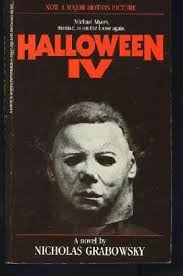
HALLOWEEN IV, THE RETURN OF MICHAEL MYERS
US, 1988, 88 minutes, Colour.
Donald Pleasence, Dannielle Harris, Ellie Cornell,
Directed by Dwight H. Little.
Halloween IV is less grisly than its predecessors. It simply reruns the original story, focusing on Jamie Lee Curtis's daughter (Jamie Lee Curtis seen in photos) and her fearless stepsister. Donald Pleasence turns up again as Dr Loomis. It's 10 years on from the original and Michael Myers terrorises the town. All fairly straightforward: some eerie suspense and some gruesome deaths.
1.Enjoyable horror in itself? As part of the series? The familiarity of the plot? Reliance on suspense and effects?
2.The date, the autumn, Illinois locations, the ordinary atmosphere for the horror?
3.Shocks, editing, grisly deaths, action? Atmospheric score?
4.Michael Myers and his story, the release, Dr Hoffmann's scepticism, the ride in the ambulance, the initial deaths, Dr Loomis confronting Dr Hoffmann, discovering the accident, the pursuit of Myers?
5.Michael Myers as evil, the deaths at the service station, in the town, his appearance in Jamie's dreams, his arrival, murders, appearances, the siege of the house, the destruction of the police station, the deaths, the final confrontation, Rachel knocking her over with the truck, the fall into the well - and reappearing in a transformed Jamie?
6.Jamie and the past, her parents, her fear, tension with Rachel, whether to go to trick or treat collection, seeing Michael Myers, in the shop with the costume, going out with Rachel, her fear, Dr Loomis, the chases in the house, in the school, on the roof with Rachel, the ugliness of the ending?
7.Rachel as the ordinary heroine, her parents, love for Brady, nice, helping Jamie, disillusioned with Brady, on the roof, her strength, the truck and running Michael Myers down?
8.The police and their work, Brady and the shop, with Kelly, caught by her father, confronting Myers, their deaths?
9.Dr Loomis and his fears, his past experience, coming to help, with the police, going to the school and setting the alarm, the ending?
10.The effect of this kind of nightmare on audiences, fears, what if...? And the heroics against powers of evil?
Published in Movie Reviews
Published in
Movie Reviews
Tagged under
Saturday, 18 September 2021 19:21
Hallifax FP: Act of Betrayal
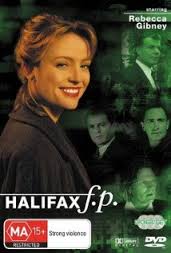
HALLIFAX FP: ACT OF BETRAYAL
Australia, 1994, 90 minutes, Colour.
Rebecca Gilling, Sophie Lee, Andrew Mc Farlane, Marcus Graham, John Gregg, Natalie Bate.
Directed by Paul Moloney.
Hallifax FP is a series devised by Roger Le Mesurier for Australian television. It was particularly successful during the mid-'90s and at least nine features were made.
The film offered a star role to Rebecca Gibney as Jane Hallifax, the forensic psychologist who resolves a number of cases using her psychological skills, her police training.
The films also offered the opportunity for many top directors to work on feature films and for many stars and character actors in the Australian film industry. Many of them, including Jacqueline Mc Kenzie, won AFI awards for their performances. The stars for this particular episode include Andrew McFarlane? as a psychiatrist and Sophie Lee as a young woman dependent on him.
The films use the Melbourne backgrounds to considerable effect and keep audiences interested with their psychological insights as well as the resolution of the mystery.
1.Entertaining murder mystery? Telemovie for the home audience? Contributing to a series about Jane Hallifax?
2.The Melbourne settings, the city itself, the courts? The surrounding countryside? Musical score?
3.The focus on Jane Hallifax? Her work, seeing her at court, cross-examinations, her psychological practice, ethical issues, personal issues?
4.The prologue and the story of the politician, his relationship to his mistress, his wife, the hospital? The shooting? Her arrest and going to court? The plea of insanity or not? The arguments? The wife and her own comments on the situation and her action? The verdict?
5.Owen Taylor and his relationship to Corrie? His practice? His sexual relationship with her? His later resistance towards her? His wife and children? Going to Tasmania? Her death, the police and the interrogation? The truth, her pregnancy, his going to pieces? His friendship with Jane, going to her? The past friendship? Obsessive? The arguments, the police, Doyle, the hospital? Jane gradually getting more information, going to the psychologist? Owen going to the edge? Taking Jane, the confession? The clifftop? His death? His motivation, his lies, affairs, his killing himself?
6.Jane and her relationship with Owen, the past, ethical issues? At home, listening to him, the police threat? Her advice, her action, not knowing the truth? His death and his wife and her?
7.The portrait of the Melbourne police, tough style, interrogations? Methods and apologies?
8.The pursuit, the clash, the truth? Doyle and Corrie? The violence, the arrest, the cell, the psychologist?
9.The court and the lawyers, the cross-examinations and their style, the judge?
10.An effective police drama, psychological dimensions, ethical issues? The law and justice? The resolution of the mystery?
Published in Movie Reviews
Published in
Movie Reviews
Tagged under
Saturday, 18 September 2021 19:21
Hound of the Baskervilles, The/ 1959
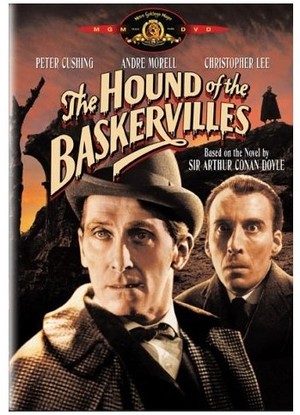
THE HOUND OF THE BASKERVILLES
UK, 1959, 86 minutes, Colour.
Peter Cushing, Andre Morell, Christopher Lee, Maria Landi, Ewen Solon, Francis de Wolff.
Directed by Terence Fisher.
The Hound of the Baskervilles is one of the many screen adaptations of Conan Doyle's classic. It was made with Basil Rathbone and Nigel Bruce as well as with Stewart Granger.
Peter Cushing seems eminently suited to Holmes - though he is a bit more vigorous than might be expected, especially in comparison with Basil Rathbone and his style. Andre Morell is a genial, if more serious, Watson. Christopher Lee has a straightforward role as Sir Henry Baskerville. (The film was made in the years of Hammer Studios' great days with Cushing and Lee in so many films from Dracula to Frankenstein to The Mummy.) Director is Terence Fisher, the veteran and considered the best director of the Hammer horrors.
The film is colourful, makes do on a small budget, has an atmosphere of horror as well as presenting Sherlock Holmes and his work.
1.Entertaining Sherlock Holmes story? Popularity of the detective, of Dr Watson, their methods? The popularity of the stories and the many film versions?
2.Peter Cushing and Andre Morell in the tradition of Holmes and Watson? Bringing the characters to life? Methods?
3.The book as a classic, the many variations and versions? How satisfying this as a version of the '50s?
4.The prologue, Sir Hugo and his depravity, his revelry, cruelty, the pursuit of the maid, her murder? His death and the legend of the Hound of the Baskervilles? (As reinforced by Dr Mortimer and Mr Stapleton?)
5.Dr Mortimer, telling the legend to Holmes and Watson? Their reactions? His concern about Sir Henry, not wanting to work with him as physician there? The fight with Sir Henry and leaving him? The going to the mine, plotting Holmes's death, collaboration with Stapleton?
6.Sir Henry, the South African background, his presence in London, the first meeting with Holmes and Watson, his lost shoe (and later as a clue)? Friendship with Holmes, returning to his home? The Barrymores and working with them? Going hunting? The visit of the bishop and his generosity? The warning not to go on the moor, the scare and his heart? The encounter with Cecile, attracted to her? The plan to go for the meal? Kissing her and being seen by Stapleton? The build-up to the final evening, Cecile luring Sir Henry to the murder scene, the hound, the rescue?
7.Stapleton, his background, the property, poor land, the trap and his warning Dr Watson? Friendship with Sir Henry? Treatment of Cecile? The truth, the Baskerville descendency, the mine and trying to kill Holmes? The plot to kill Sir Henry - the dagger, the hound? Being shot? Cecile, her explanation of her background, Spanish mother, kissing Sir Henry, attracting him, the invitation, leading him to the moor, her vengeance? Her death in the mire?
8.The story of Seldon, the escaped criminal, helping Holmes on the moor, wearing Sir Henry's clothes, killed by the hound? The Barrymores and their work, helping Seldon?
9.Peter Cushing as Holmes - the expected manner, dress, deductions, elementary? Listening to Dr Mortimer, his plans, hiding on the moor, taking over the household, the clues, the picture, the hound, the mine, his getting out alive and waiting for Dr Mortimer and Stapleton? The final confrontation, egging Sir Henry to go? The solution? His vanity? Dr Watson and his genial assistance, on the spot, walking on the moors, encountering Stapleton, friendship with Sir Henry, with Cecile? His participation in the adventures?
10.The atmosphere of the 19th century, Victorian England, the city and the countryside, sinister evil, murders and greed? Murder mysteries and solutions?
Published in Movie Reviews
Published in
Movie Reviews
Tagged under
Saturday, 18 September 2021 19:21
He Died With a Felafel In His Hand
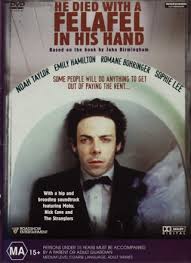
HE DIED WITH A FELAFEL IN HIS HAND
Australia, 2001, 102 minutes, Colour.
Noah Taylor, Emily Hamilton, Romane Bohringer, Alex Minglett, Brett Stewart, Damien Walshe-Howling?, Torkiel Neilson, Sophie Lee, Tien Hughes.
Directed by Richard Lowenstein.
He Died With A Felafel In His Hand is based on a novel by John Birmingham. It is a story of 20-year-olds living in squats in Brisbane, Melbourne and Sydney.
The film focuses on Daniel, played by Noah Taylor, in the succession of his roles in such films as The Year My Voice Broke, Flirting, The Prisoner of St Petersburg, The Nostradamus Kid (and even Shine). (Noah Taylor had a succession of international roles in such films as Simon Magus, Almost Famous, Vanilla Sky and Lara Croft.) Taylor portrays the bewildered young 20-year-old, twentysomething, a would-be author, bewildered by life and his encounters with the strangest people. He has an opportunity for a relationship with Sam, played by Emily Hamilton, who then is attracted by the strange European woman, a seeming witch, played by Romane Bohringer.
There is a gallery of eccentric characters in each of the houses, a muscleman, an ex-army veteran, a gay coming out of the closet, a bulimic actress (played with verve by Sophie Lee). The interaction of these characters and the offbeat verbal humour create an ironic tone in the comedy of people searching for their identity. The screenplay also adds in quite a number of philosophical remarks to indicate that people should be responding with a touch of depth.
The first part of the film ends with a celebration of the winter solstice, led by the French witch, in which people participate both seriously and comically. The film ends with a funeral of the drug addict who literally dies with a felafel in his hand as he watches television, in which people go through a ritual burning and sacrifice something that means a lot to them in tribute to the dead man. This theme of ritual and self-sacrifice also gives a tone of depth to the offbeat comedy.
Richard Lowenstein has had a career of directing music videos and commercials along with the documentary Evictions (based on a book by his mother, Wendy Lowenstein) as well as the feature films Strikebound, Dogs in Space and Say a Little Prayer.
1. The title and its impact, expectations? The way that it was visually illustrated? How it occurred within the plot?
2. The film and Australian humour, the twentysomething humour, its ironic tones, the touch of rebellion, the critique, the gallery of human foibles, the underlying hopes? The humour of confusion, passivity, challenge to do something more with life?
3. The settings: Brisbane, Melbourne, Sydney? The death and the structure of the storytelling: nine months earlier? The effect of the different locations, the visuals of the house in Brisbane, the stilts, for the summer, the cane toads in the garden? The contrast with Melbourne and its darkness and cold, the Kafkaesque tone? Sydney with its light, wealth, the harbour, ambitions? The film's comment on each of the cities? Squats in each of the cities? Climate and behaviour?
4. The focus on Daniel and Noah Taylor's screen presence and performance? His 47th squat? The effect on his life, his mother wanting him to get in touch? His appearance, woebegone, inactive, wanting to write, focused on themes of blackness? His sex story about the hand? His inertia? His kindliness towards the members of the group, interactions with each? Exasperation with Flipster but finding him dead? The encounter with Sam, the possibility of a relationship, his coming alive? The arrival of Anya and her dominance, mystery, her linking with Sam and taking her away from him?
5. The rent collectors and the comic villains, the pair, their dress, remarks, toughness, demands?
6. The different characters in the squats: Sam and her seeming ordinariness, her study, her work? Anya and her presence, seemingly purposeless? The young men and their interactions? The army vet and his golf, hitting the cane toads? Flipster and his drugs, eastern culture?
7. Brisbane and a relaxed way of life? Culminating in the celebration of the winter solstice, the celebration, the fire - with the comic touches of the victim? Others taking it seriously?
8. Daniel and his decision to go to Melbourne, the squat, different atmosphere, way of life, yet his inertia remaining? The others coming, the arrival of Sam and hopes for the future? The police, suspicions, the personality of the officers, the guns, holding up the group, the threats, the shooting - and their denying all charges (and the newspaper saying that they got off)? The contrast between Melbourne and Brisbane?
9. Sydney, the harbour, the sunshine, the warmth? The gloss of the house? Nina and her wealth, being Robert A. Corcoran with her credit cards and not paying them? The arrival of Sam, the possibility of re-establishing a relationship? Nina and her incessant chatter, bulimia, auditions, self-absorbed, criticising others, reacting when people had the opportunity to talk about themselves? Dirk and the fight about where the cans went on the shelf? His coming out of the closet, the posters, everybody else thinking he was gay, Nina's angrily pulling down the posters? The foreign visitor and his talking about how healthy everybody looked on the television or in the posters? Anya arriving again, the ambiguity, taking Sam away from Daniel? The police arriving to investigate the credit card fraud, the discussions about Dostoyevsky and the humour about the officer thinking that Daniel was Dostoyevsky? Flipster and his being in the institution, released, his dying? Danny and his continued support of each of the characters - yet his final exasperation, going into his room, their slipping food under the door? His writing the sex story and sending it to Penthouse, getting the cheque?
10. Flipster's death, the funeral, each of the characters burning something important to them as a sacrifice, the humorous symbolic touches of their character and foibles?
11. Daniel ringing the police, telling them about Nina and the card fraud, Anya leaving, his going off with Sam - to what kind of future?
12. The screenplay as illustrating the life of many twentysomethings all over the world - but a particularly Australian tone and tone of voice and humour?
Published in Movie Reviews
Published in
Movie Reviews
Tagged under
Saturday, 18 September 2021 19:21
Hideous Kinky
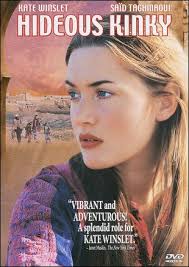
HIDEOUS KINKY
UK, 1998, 98 minutes, Colour.
Kate Winslett, Said Tadhmaoui, Bella Riza, Carrie Mullan.
Directed by Gillies Mac Kinnon.
Esther Freud's memoir novel of her experiences with her mother and young sister in Morocco in the early 70s has been translated to the screen focussing both on the mother's spiritual search (for Sufi wisdom) and the little girl's exuberant but often bewildering life in a very different culture.
Director Gillies Mac Kinnon brings great sensitivity to his film, enabling us to get to know Julia (a strong performance from Kate Winslett) and the two girls (wonderful performances from Bella Riza and Carrie Mullan in their first film). The Moroccan locations and people, filmed vividly, draw us into the experience - we feel we have been there.
But it is also the 70s (and we are constantly reminded of this by a soundtrack full of popular songs of the era) and Morocco is a new haven for hippies, people in search of life's meaning, and tourists. One wonders about such 'adventures' for little girls and their lasting effect, especially when the main thing one of them really wants is to be 'normal'. But Esther Freud's memories and insights mean that, for her, it was a great and powerful adventure.
1.A memoir and a novel translated into film? The personal authenticity?
2.The atmosphere of the 1970s: attitudes in the United Kingdom, North Africa, the Moroccans, their lifestyle, the hippies beginning to journey there, those in search of religious values, the language and jargon of the '70s? The songs?
3.The musical score and the blend of Moroccan-style music with the wide range of songs of the era? The comment on characters and the times?
4.The title, the words, the word game of Bea and Lucy? As used by Julia and Bilal?
5.The perspective of the screenplay: Julia's perspective on herself, her marriage, her search, her children, the UK? The perspective of the girls, an adventure, the contrast with being normal? The judgments being made about the particular incidents? Adventures? Moral judgments?
6.The action as adventure for all: the effect of the exotic adventure, especially for the girls? Charlotte and her perspective on the adventures, even considering it some kind of emotional abuse of the children?
7.The insertion of Julia's dreams at the beginning and the end, the violence, the daughter's being lost, the girls and death, the hand at the throat? The dreams and the interpretation - her little girl being threatened and lost?
8.The background of Islam, the Sufis and their teaching? The spiritual search, the Muslims at prayer, religious practices and customs? The influence of Islam on the United Kingdom in the '80s and '90s?
9.The background of Julia's husband, their relationship, his women, his lack of decisions? The sending of the wrong parcel for Christmas? The delays in sending the money?
10.In Marrakech: the family and their being settled, in the hotel, the Christmas parcel, the market and the people, the prostitutes and their taunts - and the fight about the pair of trousers on the line? Bilal and his acrobatics? Eva and her background with the Sufis, her friendship and discussions with Julia? The hippie colony and the hippies?
11.Kate Winslett as Julia: her screen presence, as a person, her past experience, the decision to go to Morocco, her relationship with her daughters? The search for the Sufi Guru? The meeting with Bilal, the relationship with him, sexual? Open and her daughters coming in? The issue of school and Bea wanting to go to school with a uniform, to be normal? Bea telling her the lie about the child being caned at school? The growing friendship with Bilal, his suggestion that they go for a holiday, the welcome into the town and their being showered with petals? The experience of the town, Fatima and her relationship with Bilal? Camping, swimming? praying? Sharing and the idyll? The unreliability of Bilal, his going for food, returning with the sardines? The girls being sick? Time to go back to Marrakech? The policeman recognising him?
12.Santono and the encounter with Julia? His knowledge of her husband? His welcoming her to his home? Charlotte and the other guests? The tax man and his sardonic remarks about Islam and the spiritual search, his worldliness? The children enjoying the comfort, the bed, playing games, the food? Going to school and Bea deciding to stay in Marrakech? Julia and Lucy deciding to leave?
13.The trip to Algiers, getting the lift, the dangers on the road, the hippie and his being "out of it"? Standing on the back of the truck with his arms outstretched like the cross? The camel coming across the road and the driver being drowsy? Julia deciding to continue on foot? Finding the palace, finding the Guru dead and being buried? The encounter with his assistant, the questions, very matter-of-fact, her facing herself, realising that she was not ready?
14.The return to Marrakech, the dismay with Bea having gone? Santono and Charlotte gone? The search, information? Going to Patricia's institution for those with polio? Bea and her appearance, dress, pigtails, working? The fundamentalist Christian attitudes? Her attitude towards her mother? Gradually changing, her illness, the visit of the doctor? Julia and making the decision to return to London?
15.The portrait of the girls, in themselves, their age, experience, the strange situation, their ability to adapt? Wanting to celebrate Christmas? Going to the market? Meeting the people, learning some of the language? The customs? Telling each other stories and their ability to imagine? Their words like "hideous" and "kinky"? Wanting normality? The friendship with Bilal, seeing him as a father figure? Their common sense and their advice to their mother? The cumulative effect of the experiences? The final wish to return to Morocco?
16.Bilal, in the marketplace, acrobatics? In the quarries working, the attack on the overseer? The cruelty? The policeman wanting to interrogate him? The meeting with the girls, with Julia, the relationship, sexual relationship? His wanting to escape from the city, taking them on the holiday? The welcome to the city? The police, Fatima? The uninhibited joy, the swimming sequence? Yet his suspicions about Julia's religious attitudes? The sardines and their leaving? His sudden return, working for the tourists, his telling fortunes and the American tourist calling him a loser? In the uniform, the decision to sell the uniform? Getting the money for the tickets - and the final scene with him in the car, with the scarf, waving goodbye?
17.The tickets, the possibility of returning home, Eva and the shoe of the Guru and the children making a wish? Going back to England?
18.The effect of the experience? Memoir and transformed into Esther Freud's novel?
Published in Movie Reviews
Published in
Movie Reviews
Tagged under
Saturday, 18 September 2021 19:21
Hurricane, The
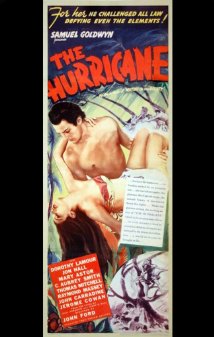
THE HURRICANE
US, 1937, 110 minutes, Black and White.
Dorothy Lamour, Jon Hall, C. Aubrey Smith, Mary Astor, Raymond Massey, Thomas Mitchell, John Carradine, Jerome Cowan.
Directed by John Ford
The Hurricane is a John Ford film, an adventure set in Polynesia, a variation on his western themes which were soon to become a focus of his film-making with Stagecoach the following year.
The basic plot is rather creaky: a romantic picture of the South Sea Islands, autocratic French rule with an emphasis on law rather than justice, a group of estranged Europeans on the South Seas, the South Sea Islanders themselves losing their idyllic world. Into this screenplay comes an extraordinary hurricane which changes the island, destroying it, yet giving the islanders some kind of freedom as the French authority is forced to focus on justice rather than the letter of the law.
The hurricane sequences are quite spectacular, directed by James Basevi who had been responsible for the fire in In Old Chicago, the earthquake in San Francisco and the locust plague in The Good Earth. The screenplay is by Dudley Nichols, regular screenwriter for Ford.
The film introduced Dorothy Lamour and her sarong, gave a good role to Jon Hall who was to be an action star during the '40s. However, it is the strong supporting cast which makes a difference: Raymond Massey as the governor and Mary Astor as his wife, Thomas Mitchell as the alcoholic doctor, John Carradine as the guard and C. Aubrey Smith as the dedicated priest.
The film was remade in the late '70s on location, with a spectacular hurricane - but it made little impact in its time. Its stars were Mia Farrow, Jason Robards, Trevor Howard and Dayton Ka'ne.
1.Entertaining South Sea adventure? Themes of the colonial European authorities and the islanders? Natural disasters - and the possibilities for change?
2.Black and white photography, the Hawaiian locations? The beaches, the islands? The villages and the ritual customs? The special effects for the hurricane itself? The musical score?
3.The title and the focus on the hurricane, the dangers in the islands, the response of the islanders, of the European settlers? The destructiveness and cleansing of the hurricane?
4.The colonial background, French authorities, the letter of the law instead of justice? Not understanding the islanders? Their customs? Their being Christianised? The contrast with the Catholic ceremonies and moving into the traditional ceremonies as for the wedding? The life of the expatriates and their trying to preserve France in the South Pacific?
5.Marama (and Dorothy Lamour's career) and Terangi (and Jon Hall's career)? The Hollywood stars as islanders? The idyllic life, the customs, the betrothal? Terangi on the ship, working as a white sailor on a white ship? Diving overboard, the return to the island? The wedding ceremony? The clash with the authorities, Terangi required on the boat? His arrest, imprisonment? The humiliation, the cell, his attempts to escape, the increase in his sentence? The authorities, Mr De Lage and his severity? The guard and his brutality? The years passing? Marama at home, the consolation from the church, the help from Father Paul? The doctor and his help? The birth of the child, growing up? The escape of Terangi, the violence and the authorities searching for him? The islanders sending the message, Father Paul rescuing him from the sea? The governor and his severe attitude? The coming of the hurricane, Terangi saving Marama and Mrs De Lage, tying her to the tree? The subsiding of the hurricane? De Lage's return, finding his wife? Letting Terangi and Marama go free? Their new life?
6.De Lage, his style, authority, autocratic? French traditions? Hosting meals? The return of his wife? His severity towards Terangi? The passing of the years, the escape attempts? Discussions with Father Paul, upbraiding Father Paul for helping Terangi? Searching for him, missing the hurricane, his grief for his wife, the search, finding her? His change of heart? Mrs De Lage, her life on the island, devotion to her husband? Concern for Terangi and Marama? The experience of the hurricane?
7.Father Paul, kindly, the French missionary, the role of the Catholic church, Christianising Polynesian customs? His help of Terangi? Taking the people to the church, holding them together, the destruction of the church?
8.The doctor, sailing past the island, telling the story to the tourist? His own years on the islands? Drinking? Concern for Terangi? Arguments with De Lage? Surviving?
9.The prison, the guards, the brutality of the Europeans towards the islanders? The contrast with the captain of the ship and his concern and help for Terangi?
10.Popular ingredients of South Sea Island films since the '30s? The establishing of the conventions in the hurricane? Their becoming conventions, even cliches afterwards?
Published in Movie Reviews
Published in
Movie Reviews
Tagged under
Saturday, 18 September 2021 19:21
Hunting

HUNTING
Australia, 1990, 97 minutes, Colour.
John Savage, Kerry Armstrong, Guy Pearce, Rebecca Rigg.
Directed by Frank Howson.
Hunting is a rather baroque drama about the financial wheeler-dealings in finances in the '80s. It has an American tycoon (played by John Savage who, according to type casting, is not entirely persuasive as such a bad villain). It also shows the Australian business scene, the world of deals and the media, the background of drug deals, political pressure.
The film is stylishly made - and runs the risk of being considered pretentious. It has the courage of its baroque convictions as it melodramatises the characters and the situations, highlights dramatic visual compositions, uses symbols such as the moth to the flame.
The film has a strong supporting cast led by Kerry Armstrong, who was nominated for an AFI award as best actress, 1990.
The film was written and directed by Frank Howson, the writer and/or the director of such dramas as Boulevard of Broken Dreams, Heaven Tonight, What the Moon Saw. While the film might be too melodramatic for some tastes, it is an attempt to dramatise some of the puzzling finance crises of the period.
1.The title, symbolism?
2.The Australian atmosphere, the use of Melbourne locations, their moods? Behind the credits? The world of business and wealth, contrast with suburbia? Authentic, stylised? The score and the atmosphere?
3.The use of widescreen process, the baroque style, sets and decor, the various uses of slow motion, editing and pace, compositions, symbols like the moth and the flame? Pretentious or not?
4.The credibility of the plot, wealth and takeover in the '80s, drug wealth, politics, banks, deals, media?
5.An allegory of Australia in the world of big business in the '80s? Michelle symbolising Australia - seduced by greedy powers, set up, abused, mocked and raped, angered and reacting violently?
6.Kerry Armstrong as Michelle: establishing her character in her going to work, in slow motion through the city of Melbourne, giving a context of her life? Her work, secretary, the boss? Friendship with Debra and their talking? Meeting Michael Bergman and making a fool of herself, the handkerchief? Gawky? At work? Tense with Larry? In love with her husband, yet frigid? Washing the handkerchief? Phoning, going to deliver it, hesitating at the door, being invited into the party? Meeting with the wealthy and influential? Talk about the Harris name? With Michael, going out with him, the club, her decision to go home? The roses? Seduces, his gentleness? Her lying to Larry? The phone calls, working back, committed to Bergman?
7.The portrait of Larry: in himself, his loss of job, his watching TV, becoming a slob, his love for Michelle, sexual impotence, watching It's a Wonderful Life and the comments about God and fate? His suspicions of Michelle, his sending the venomous cartoon to Bergman? The visit and the threat - and his being recorded on the video? His being killed? Reappearing on the video and finally seen by Michelle? As part of her final violent motivation?
8.Michael Bergman and his presence in Australia, American with Australian citizenship, mysterious, charm, the first meeting with Michelle, going in with the banker, spending so much time? The accident, the handkerchief? At home, inviting Michelle in, hosting her, the outing, the club? The attempted seduction but not pressuring her? His style? The roses and the phone call? Her return, the sexual encounters, sensuality, their being filmed on video? His set-up at home, financial deals, being seen on television, buying the Los Angeles media organisation, `a true believer' in his interviews? With Michelle, gradually becoming harsher, telling her to shut up, ousting her from the meetings? His own troubles? The visit from Larry? His bodyguard and henchman? Larry's death? Growing pressures, the meeting with the umbrellas and the rain? The contrast with his public appearance on the telethon and his generosity? The phone calls, the news of the collapse? His being kept waiting by the banker? The clash with Michelle, her telling him about the abortion? His sexual encounter with Debbie and wanting to be seen by Michelle? The formal dinner, his hold over the guests, treatment of Michelle, the rape, the guest taking advantage of her, the formality of his apology? The portrayal of an evil man?
9.Michelle, conscious, going to confession, the significance of her dreams, as a child, the funeral, the church and the hymns - her future? Larry's death, blaming herself, the conversations with Debbie? Her being spurned by Michael, the bitter telling of the truth, the abortion? Her disgust at seeing Debbie with him? Her searching out the drugs and her being caught, the meal, the formality, the rape? Her final decision? shooting him?
10.Michael, his success, failure? Michelle's shooting him? His death - melodramatically staged? The irony of the video being on with him talking?
11.Stockton, the bankers, work, relationship with Michelle, the hold by Michael Bergman, disdaining him in failure, his recovery, presence at the meal?
12.The bodyguard, sinister, homosexual overtones, with Larry, the murder, watching the videos, the meal?
13.The corporate high-fliers, money, their lifestyle, their cruelty? Presented in baroque melodrama?
Published in Movie Reviews
Published in
Movie Reviews
Tagged under
Saturday, 18 September 2021 19:21
Hunt For Red October, The
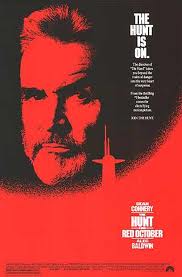
THE HUNT FOR RED OCTOBER
US, 1990, 135 minutes, Colour.
Alec Baldwin, Sean Connery, Sam Neill, Scott Glenn, James Earl Jones.
Directed by John Mc Tiernan.
Hunt for Red October is based on the bestseller by Tom Clancy, a specialist in thrillers focusing on Soviet and American relationships. The film, released at the beginning of 1990, suffered a little with the opening up of Eastern Europe. However, a prologue was added to indicate the changes and to remind people of the cold war in the mid-'80s before Gorbachev.
The film was directed by John McTiernan?, noted for his thrillers Nomads, Predator and especially Die Hard. The film looks impressive, a great deal of technological detail with the submarines, fine action adventure material.
The film has a strong cast led by Sean Connery. In fact, most of the stars are subordinate to Connery's star turn. However, it proved to be a popular, entertaining adventure thriller.
The two sequels Patriot Games and Clear and Present Danger starred Harrison Ford instead of Alec Baldwin as Jack Ryan.
1.Interesting and exciting thriller? World politics at the end of the '80s? The change in the Eastern Bloc?
2.The basis in a bestseller, the bestseller style of movie? The work of the director, action adventure? The strong cast? Special effects and action?
3.Widescreen photography, the presentation of technology, sea, underwater sequences? Editing for action and tension? Music, score and choral music?
4.The atmosphere of Glasnost in the '80s? The film set in pre-Gorbachev days? Signalling the changes? The cold war between the Soviet Union and the United States? Changes in cooperation? A film of what might have been?
5.The familiar plot with submarines, nuclear power, threats? The captain and his testing of submarines, conscience and the possibility of defecting? Orders? His skill? The background of diplomacy? The hunt? The intercutting between the Soviet Union and the US?
6.Sean Connery as Raimius? The Lithuanian? His solid and grizzled appearance? As seen by the Soviets, by the Americans? On board his submarine, his skills? Relationship with officers, crew? Putin and Soviet orders, the suddenness of Raimius killing kin, the cover-up? The meal with the officers and the plans? The cook as spy? Bordin and his support, loyalty? The submarine and its extensive technology, the skills in running it, manoeuvring it? Maps? The sailing of the ship, the undersea features, torpedoes?
7.Raimius's motivation, his status in the Soviet Union, America as a dream? Freedom? Bordin's dream of Montana? The strength and motivation for the defection? The cat and mouse with the Americans, with the pursuing Russian submarine?
8.The American investigation, Jack Ryan and his skills, Admiral Greer and his support, Skip Tyler and his knowledge of submarines? The meetings and discussions, the politicians, diplomacy? Ryan and his opinions, their being spurned by the politicians? Pelt and his support? The speculation about the defection?
9.Jack Ryan and his family, ordinariness, his academic skills, to Washington, speculation about Raimius, about the submarine and its technology? Pelt supporting him? Flying and his airsickness, going into action, transferred to the submarine? Collaborating with Mancuso and his staff, the arguments? The decisions?
10.Seaman Jones and his skills, tracking the submarine? Important information? Mancuso and the command of the submarine, orders, hunches? Torpedoes, tracking the submarine? His choices based on Ryan's advice and Raimius's manoeuvres?
11.The Russians, understanding that the submarine was being taken, the reaction to Raimius? The submarine pursuit? The bond between the captain of the submarine and Raimius? The Russian ambassador and his interviews with Pelt, the story about the breakdown, the story and the elaboration of the plot for hunting Raimius?
12.Cult, southern American diplomacy, his trusting of Ryan, fencing with the Russian ambassador? His smooth cover-ups?
13.The faking of the leak, nuclear tension, the crew and their being picked up by the Americans? Raimius's skill at setting up the scare, covering his defection? The spy and the opening fire? Ryan and his presence on the submarine? Bordin's death? The final escape?
14.The action and the shootout, Raimius being hit, the torpedo from the Russian submarine destroying itself? The end and the Americans gaining the Red October?
15.The blend of action, character study, suspense? Cold war, dangers, technology? Diplomacy? Heroics and freedom?
Published in Movie Reviews
Published in
Movie Reviews
Tagged under
Saturday, 18 September 2021 19:21
Hungry Heart
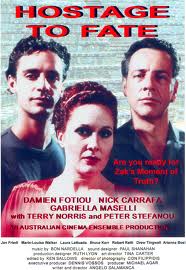
HUNGRY HEART
Australia, 1987, 95 minutes, Colour.
Nick Carrafa, Dasha Blahova, John Flaus, Sheila Florance, Norman Kaye.
Directed by Luigi Aquisto.
Hungry Heart is a slice of Melbourne life, with melancholic touches. It focuses on an Italian family, Sal (Salvatore) trained to be a doctor but preferring to wander and take stock of life. He encounters a young woman, Kate, falls in love with her, moves in with her, falls in and out of love. The film also focuses on Sal's family, Italians settling into Melbourne, his grandfather who mourns his dead wife, stands in the middle of the road in order to be run over. There is also Kate's lesbian friend who is jealous of Kate. Next door to the Italian family is a former priest who has experienced a loss of faith (played with dignity by Norman Kaye). The film shows life in the inner suburbs of Melbourne as well as in holiday towns and resorts. However, the film is more a sketch of people in transition and the film is open-ended. It was produced by Rosa Colosimo, a prolific producer of small-budget Australian films.
1.The title, reference to Sal, his family, Kate, her friend, Mr O'Ryan?
2.The Melbourne settings, the suburbs and houses, pubs? The country roads, the beach, country hotels? The contemporary songs? Musical score?
3.The focus on Sal, the car and the breakdown, the passing of Kate in the tram? The meaning and meaninglessness of his life? Coming home? His mother, the family? Finding his grandfather on the street and taking him home? Trying to settle down? Meeting his friends, Charlie and his debts, Tony and his acting? The club and performances? The encounter with Kate, the attraction? Tracking her down at the pool? Getting to know each other? The relationship, going to Lorne, the hotel, the beach? The jealousy of her friend? Going together? His decision to move in? Their shared experiences, talking, love? His own uncertainties? Kate and her work, her desires? The visit of her father? The fancy dress party, Sal's moodiness, criticism of Kate and her dress, the make-up? The clash? The arguments and her finally leaving? Sal's jealousy about her boyfriend? His wandering? Decision to help Charlie steal his godfather's dogs? The home visits? The support of his mother? His grandfather and the accidents? The return to the house, the sexual encounter with Kate's friend, her departure? Kate's return - the uncertainties? The future?
4.Kate, vivacity, her background from the country? Her work as a wool classer? The rehearsals, the relationship with her friend? The encounter with Sal, the attraction? His meeting her again at the pool? Going to Lorne, the beach, the talking, the hotel? Coping with her friend's jealousy? The bonds between Sal and herself, his moving in? The clash at the fancy dress party, her taking off her make-up, changing her dress? Sal's not being dependable? Her visit with her father, discussing things and the seriousness of the relationship? Her decision to leave, the return, the shock at her friend's behaviour, departure? Talking things through with Sal - a future or not?
5.Sal's family, the Italian background? Tradition, relationships, bonds? The old man in the cemetery, his dead wife, her photo? Wanting to be run over? Brought home by Sal? His friendship with Kate and support of her? The driver who almost ran him over and brought him home? Sal's mother, stories about the past, her support of her son? His sisters and his interaction with them?
6.Kate's father, from the country, traditional, trying to eat the spaghetti, support of his daughter?
7.Mr O'Ryan, his writing poetry, his reflections? Serious - or pretentious? The ex-priest, the family calling him `Father'? Walking his dog, his garden? Support of the family, especially the grandfather? His loss of faith?
8.Kate's friend, singer, lesbian? Friendship with Kate, sharing the house? Kate's discussions with her, the memories of the friendship with the girl at school and her parents' reactions? Her reaction to Sal? The night together?
9.Charlie and Tony, Sal's friends, their way of life? The debt, the stealing of the dogs? Tony and his acting, accent?
10.A cross-section of Melbourne city life? Relationships? Uncertainties? Hungry hearts?
Published in Movie Reviews
Published in
Movie Reviews
Tagged under